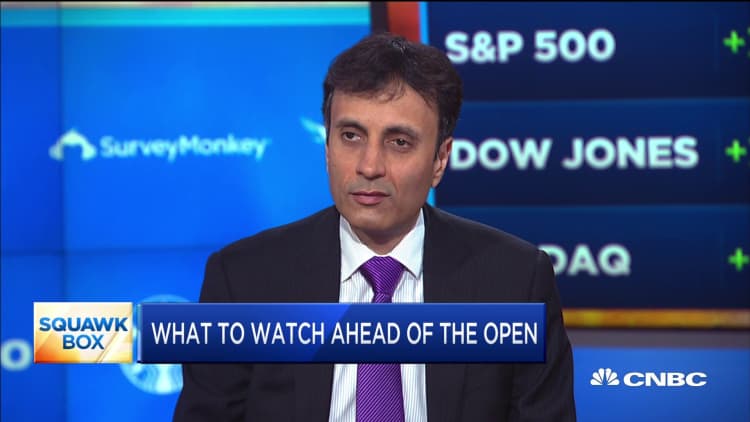
The U.S. stock market sits at century highs versus global equities because of the furious outperformance over the past decade, the chief global strategist of Morgan Stanley Investment Management told CNBC on Monday.
However, Ruchir Sharma predicted that won't likely continue in the 2020s at the same pace.
"This has been America's decade by far. In terms of the American stock market over the last decade, it has been up 250%. All of the other world stock markets, on average, are up 50% or 60%," Sharma said in a "Squawk Box" interview.
Sharma, also head of emerging markets at Morgan Stanley's wealth group, said that he's "never seen a period of such outperformance" by the U.S. stock market. "So the American stock market today, relative to the rest of the world, is at a 100-year high, both in relative price terms and also in terms of the valuations."
U.S. stocks currently account for 56% of the world's market value but only 25% of global economic output, Sharma said. "I think that is bound to narrow in the coming decade," he added, calling that a "huge disconnect."
In a note to clients, Sharma wrote:
"In every decade since World War II, global investors have flocked to a hot new theme. The 1950s were about stocks linked to a recovering Europe, the 60s were about big American companies known as the 'Nifty-Fifty', the 70s about emerging world exporters of commodities like gold and oil.
"The 80's saw a spectacular surge in Japanese stocks, which gave way to the American-led tech boom in the 90s, and then to emerging markets dominating in the 2000s. The 2010s saw outsized returns for American mega caps. But if history is any guide the 2020s won't be another American decade."
The current boom in U.S. stocks, which started March 9, 2009 in the ashes of the financial crisis, is the longest and best-performing bull market since World War II. It's been fueled in large part by the easy money policies of the Federal Reserve and central banks around the world.
Since the end of the U.S. Great Recession in 2009, the Fed hiked near-zero short-term interest rates nine times from 2015 to 2018, before cutting rates three times last year to a range of 1.50%-1.75%. Over that period, central banks in Europe and Japan went to negative rates.
President Donald Trump has also delivered on promises to cut corporate taxes and regulations, which led to the S&P 500 soaring more than 56% since he won the 2016 election. As the 2020 election cycle kicks into high-gear, Trump is running for another term on what he sees as his contributions that helped the economy and stock market thrive.


